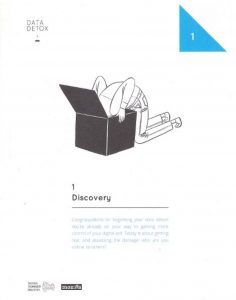The Chinese government intends to create a social credit system by the year 2020. Data about the behavior of each individual from all social spheres of life shall be collected, evaluated and transformed into a personal score. Consumption, traffic offenses, activities on the internet, employment contracts, ratings at school and work, conflicts with the landlord and the behavior of children will all count towards the individual’s score. The system will register every person, willingly or unwillingly, with the goal of reflecting an authentic and accurate overall picture of the human being. Thereby the Chinese government intends to reward sincerity and create “a mentality of honesty.” [*1]
Sounds like a dystopia — so unlike ‘us,’ right?
I wouldn’t be so sure . . .
In the Social Change and the German Public Sphere class led by Ulrike Wagner this semester, we discussed excerpts from Steffen Mau’s book The Metric Society: On the Quantification of the Social in which the sociologist argues that current trends reflect a society of stars, scores, ranks and ratings [*2]. You might regard the example of the planned social credit system in China as extreme, but he identifies the very same structures in our everyday behavior and practices.
Look around you: take your phone and check your social media account. How many likes did you get on your last shared picture? How many friends and followers can you boast about? One might argue that these numbers don’t really matter and don’t define your self-worth or the other’s view of you. However, Steffen Mau argues that comparable quantified data necessarily creates depictions of status. When we constantly document our activities and integrate them into a rating system, we lose the freedom to act independently of expectations and evaluation [*3]: You become a performer, investing in an artificial production of yourself. Become better — better faster. Since numbers go towards infinity, the pursuit has an open end.
But be better than whom? The author argues that self-optimization is not the only result of quantifying the self but that these processes lead to a universalization of competition. The ostensible objectivity of data makes even the most private matters like hobbies, family relations, and habits measureable. The sharing of successes after doing sports on an app, for example, already creates a ranking — be it implicitly or explicitly. The published result puts other users under pressure and thus motivates them to surpass the score. Mau asserts that comparison with the surroundings enhances performance because low self-esteem can be compensated and improved through ‘better’ achievements [*4].
It remains for us to reflect on where we can identify these patterns in our own lives. We must think about if and how the quantification of our performances as well as comparison and competition with others determine our acts. The metrical representation of qualitative effort can deeply manipulate our ideas, values and motivation. What is nearest to the everyday reality of a student is performance in university. Education can be regarded as a valuable good in and of itself. However, considering the quantification of a student’s qualitative contributions and the visibility of these through grades and GPA scores, the inherently meaningful pathway of education can easily be reduced to the accumulation of numerical evaluations. One’s further possibilities in life and implicitly social status become thus determined by expectations of performance and the acquisition of a high score within the particular educational system.
What is so dangerous about the growing tendency to measure our performance, be it in health, dating chances or physical fitness, and express it in seemingly objective numbers? These quantifications do not merely display facts, but (re)construct our understanding of the desirable, the valuable. Steffen Mau calls it the construction of “social worthiness” [*5]. But I also hear an echo of Plato’s Republic revealing the question: Who shapes your desires and how can you reclaim agency?
The danger lies in how deeply we internalize the evaluation and even start defining our own and others’ worth in numbers and constructed categories that quantify qualitative human uniqueness and pretend to make it comparable. We don’t need to be shocked by an official social credit system as we’ve already established one invisibly. What do our grades truly reflect about our intelligence and ability to critically engage with the world? What do numbers of interested persons on dating websites reveal about our worthiness to be loved and love? How do Instagram likes create a scale to evaluate human beauty? And, most importantly: While we surrender to certain structures of quantification, consciously or unconsciously, willingly or unwillingly, how do we maintain agency and free ourselves of expectations and socially constructed categories that falsely determine our worth?
Detox first. In eight days. This is what Tactical Tech, a non-profit organisation working at the intersection of technology, human rights and civil liberties, advised us students do when the class visited the organisation in Berlin [*6]. To not lose oneself and drown in the waves of the data world, we were given a Data Detox Kit. Opening the rescue package, this is what you find first:

The next steps focus on sensitizing the individual to the data he or she leaves behind online and which information phones, apps, browsers and social media save about the user. The goal is to question how and what digital identity is created in order to reclaim agency. To this end, our class will host a ‘glass room’ experience on the 7th of December — a special program by Tactical Tech that will make your online life excitingly visible. The organization provides the material so that we can build our own glass room in class [*7]. You are most welcome to attend the experiment on that day.

As the Data Detox Kit shows, every change begins with an awareness of and about the self. One day after I typed out these questions, I came across this beautiful Geo Wissen magazine cover emblazoned with the words Zeit für die Seele (“Time for the Soul”) in a store window at U-Bahnhof Osloer Straße. Ironically, I only took a look because there were 11 minutes left to wait for the 150 bus to Buch. Being caught up in the structures of time and work again, this magazine served as a wonderful reminder to take a conscious pause and reflect: How do I organize my day? How do I deal with the growing pressure to perform and function? What causes the mechanization of human beings and how can I free myself of an alien systematization of my being? In all the time I act, I make, I do, how much time is there for myself to simply be; to consciously break with the invisible force of constant expectations, duties and work?
Pause.
Sometimes it’s as simple as that.
The magazine contains rich and captivating articles about rediscovering the self and the world more consciously by slowing down and activating the senses and re-centering the self continually. A part describes how hecticness, digitalization, and addiction to the internet weigh us down and stand in the way of us feeling fully like ourselves; we must take on the responsibility of designing a more conscious, calm, and creative life. (Un)fortunately, all articles are written in German, so I’d suggest you take your language course seriously so you might be able participate in a class that helps you be near the pulse of German society and its fascinating themes. Language is the key to access and question the divisive debates in German(y) and engage critically with them. At our campus at Bard College Berlin, where the language of instruction is English, we can easily lose our sense of place: as students we should be conscious that the reality of our surroundings is German.
After our discussions in class and empowered by the insights on time for the self, I feel confident enough to make the case that human beings have the mental-emotional capacities to refuse to be solely characterized by constructed categories. We don’t have to submit systematically and ideally to the quantification of the self and social. Centering the self again allows us to actively and consciously prioritize where to invest our energy. It is up to us as individuals to decide which channels of investing, creating and receiving energy are healthy, refreshing, and vital. Cultivating consciousness will furthermore allow us to redefine our relationship to technology, allowing us to reclaim our freedom in this sphere as we recognise that we have authority over what data to share and not.
We began our first semester at BCB with Plato, who reminds us with the figure of Socrates that reclaiming agency to form the deepest structures of the self is so easily lost but essential if we are to live a conscious life. I would put forward that the first step in winning agency back is to find complete stillness, silent self-reflection in a world that is ever demanding of performances, efforts and achievements. A conscious self doesn’t contradict an active one. On the contrary, if we embed our ambitions into a self-constructed and not externally constructed system of meaning, if we define worthiness critically and actively on our own terms again, then “human doings” [*8] become human beings again.
The term human doings is shaped by the psychologist and meditation teacher Dr. Tara Brach [*9]. Her teachings combine Western psychology and Eastern spiritual practices to cultivate a conscious inner life and active engagement with the outer world — a balance many of us lose so easily. Her approach of combining different regional philosophies and practices shows that creating space for the self goes beyond physical territory and temporal spheres. In her lecture The Sacred Pause she describes the need to constantly do some-thing, to define oneself by a constant chain of activity. But human beings, I realize, they come back to themselves and remember to simply be.
—
Notes:
[1] Mau, Steffen. Das metrische Wir: Über die Quantifizierung des Sozialen. Suhrkamp, 2017, p.9.
[2] p.10
[3] p.13
[4] p.54
[5] p.14
[6] “About Us.” Tactical Technology Collective, tacticaltech.org/pages/about-us/.
[7] “The Glass Room Experience.” Tactical Technology Collective, tacticaltech.org/pages/the-glass-room-experience/.
[8]“Transcript: The Sacred Pause.” Tara Brach, 14 Oct. 2018, www.tarabrach.com/transcript-sacred-pause/, p.3.
[9] “About.” Tara Brach, www.tarabrach.com/about/.

